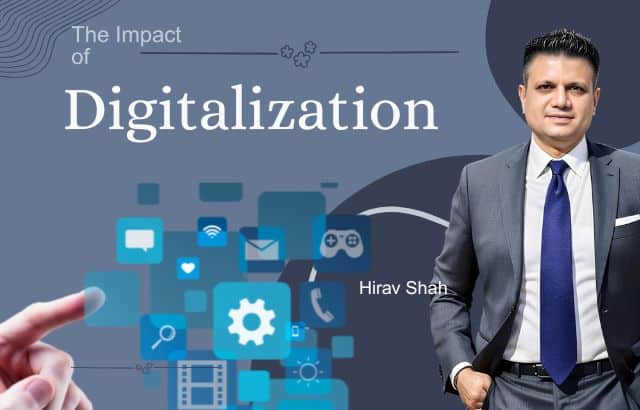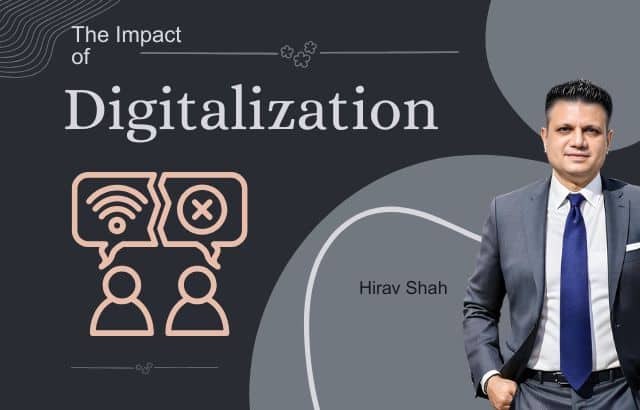Digitalization has radically transformed society, reshaping the way we work, communicate, and live. From the explosion of smartphones and social media to the automation of entire industries, this digital revolution is redefining our everyday experiences. In this article, we will explore how digitalization is influencing our future, the advantages and challenges it brings, and the critical role of business strategists in navigating this change.
Table of Contents
The Impact of Digitalization on the Workforce

Digitalization has had a profound impact on the workforce, shifting how we work and what skills are required to thrive. One of the most significant changes has been the rise of automation and artificial intelligence (AI). These technologies have not only displaced certain jobs but have also created new roles and opportunities in emerging industries.
For example, AI-driven tools are transforming fields like healthcare, where algorithms assist doctors in diagnosing diseases from medical imaging, significantly improving accuracy. However, automation in manufacturing and other industries has led to job losses in traditional sectors, especially for lower-skilled workers.
Role of Business Strategists:

A business strategist like Hirav Shah plays a critical role in helping companies adapt to these shifts. He believes that business leaders must proactively plan for upskilling and reskilling their workforce to mitigate the risks of job displacement. His approach involves assessing the current workforce landscape, identifying skill gaps, and designing training programs that ensure employees remain competitive in the digital age.
Additionally, the rise of remote work and flexible schedules has given workers greater control over their work-life balance. Virtual collaboration tools like Slack, Zoom, and Asana have become everyday necessities, enabling teams to work from virtually anywhere. However, the flexibility of remote work also comes with its own set of challenges, including maintaining productivity and fostering team cohesion.
The Advantages and Disadvantages of Digitalization
While digitalization has undoubtedly made life easier and more efficient, it comes with both benefits and drawbacks that society must address.
Advantages:

- Increased Efficiency and Productivity: Digital tools enable businesses to streamline operations. For example, AI-driven analytics platforms allow companies to make data-driven decisions faster, resulting in improved performance.
- Global Connectivity: Social media, email, and other digital platforms have made communication instant, allowing people to connect globally, breaking down geographical barriers.
- Business Expansion: Digitalization has opened new doors for businesses to reach global audiences. For instance, e-commerce platforms like Amazon and Shopify allow small businesses to scale rapidly, reaching customers worldwide.
Disadvantages:
- Job Displacement: As automation and AI evolve, many traditional jobs may be replaced by machines. For instance, robots in warehouses are already replacing manual labor in logistics.
- Privacy and Security Risks: With the growing amount of data being collected, privacy concerns are at an all-time high. Data breaches and identity theft are real threats in an increasingly connected world.
The Role of Business Strategists:
Hirav Shah often emphasizes that business strategists need to address these risks by focusing on robust cybersecurity measures and creating comprehensive data protection policies. Equally important is their role in identifying business models that can help companies diversify their revenue streams to cushion the impact of job automation.
The Role of Artificial Intelligence in Digitalization
Artificial intelligence (AI) is at the heart of digitalization, driving efficiency, innovation, and new business models. AI technologies are increasingly being used across various sectors to automate processes, analyze data, and make intelligent decisions.
Examples of AI in Different Sectors:
- Healthcare: AI algorithms are used for early detection of diseases, such as detecting cancer through medical imaging or analyzing genetic data to predict the likelihood of conditions like heart disease.
- Finance: AI-powered chatbots and virtual assistants are revolutionizing customer service. For instance, chatbots on platforms like banks’ websites provide immediate assistance for inquiries, reducing wait times and increasing efficiency.
- Manufacturing: In industries like automotive, AI is used to optimize supply chains, reduce waste, and improve quality control in production lines. Companies like Tesla are leveraging AI for self-driving technology.
Challenges of AI: Despite its potential, AI raises concerns about job displacement and bias in decision-making. For example, some AI systems have been criticized for being biased, particularly in hiring processes.
The Role of Business Strategists: Hirav Shah advocates for a careful balance between the integration of AI and preserving human jobs. He believes that upskilling initiatives must be implemented to ensure that workers can move into roles that complement AI, such as overseeing automation or managing AI systems.
How Digitalization is Transforming Industries

Digitalization, powered by AI and other technologies, is revolutionizing industries, from healthcare to manufacturing. The widespread use of cloud computing, big data analytics, and internet of things (IoT) technologies has transformed how businesses operate.
Key Industry Transformations:
- Retail: Online shopping platforms like Amazon and Alibaba have disrupted traditional brick-and-mortar stores. Businesses now need to think digitally to stay competitive, leveraging online marketplaces, customer data analytics, and social media marketing.
- Finance: Fintech companies are reshaping the financial landscape by offering more accessible services through apps and platforms like PayPal, Stripe, and Square. These platforms have brought financial services to underserved populations globally.
- Logistics: Companies like DHL and FedEx use AI and IoT to optimize shipping routes, reduce fuel consumption, and improve delivery efficiency.
The Role of Business Strategists: In such rapidly evolving sectors, business strategists like Hirav Shah help companies develop digital transformation roadmaps. They work on identifying growth opportunities within the digital ecosystem and ensure companies stay agile in the face of technological change.
The Future of Digitalization and Its Impact on Society
As we look to the future, the continued evolution of digitalization promises to transform every facet of society. We will see even greater integration of smart devices, AI systems, and 5G networks, enhancing everything from healthcare delivery to education.
Potential Effects on Society:
- Job Displacement: As AI and automation become more widespread, certain jobs will continue to be replaced. However, new job categories will also emerge, requiring new skill sets.
- Ethical Concerns: Issues related to privacy, security, and AI bias must be addressed. Data transparency and the ethical use of AI will be crucial to maintaining public trust.
- Digital Divide: Access to technology will remain an issue in many parts of the world, exacerbating inequality. Digital literacy and access must be prioritized to ensure that no one is left behind.
Business Strategist Role: Hirav Shah stresses the importance of creating inclusive digital ecosystems. Strategists must focus on implementing policies that promote digital literacy, affordable access to technology, and inclusive business models that cater to all segments of society.
Frequently Asked Questions (FAQs)
1. How will digitalization affect jobs in the future?
Digitalization will likely displace certain manual jobs but will also create new roles in areas like AI, data science, cybersecurity, and digital marketing. The key challenge is ensuring workers are retrained to take on these new roles.
2. What are the risks associated with digitalization?
Risks include job displacement, cybersecurity threats, and the potential for widening inequality due to the digital divide. These issues must be addressed through responsible policies and investment in education.
3. Can AI replace human intelligence?
AI can automate specific tasks that require data processing and pattern recognition, but it cannot replicate human creativity, emotional intelligence, and complex problem-solving. The future will likely involve collaboration between humans and AI.
Conclusion
In conclusion, digitalization is reshaping society in ways we could not have imagined a few decades ago. The advent of AI, automation, and digital tools has revolutionized industries and created new opportunities, but it has also raised concerns about job displacement, security risks, and inequality. The role of business strategists, such as Hirav Shah, is pivotal in helping businesses navigate this transformation by identifying opportunities, mitigating risks, and ensuring the responsible use of technology. By addressing these challenges head-on, we can ensure that digitalization benefits everyone, creating a more connected, efficient, and inclusive society.















